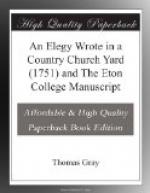“And here,” comments Mason, “the Poem was originally intended to conclude, before the happy idea of the hoary-headed Swain, &c. suggested itself to him.” To reconstitute the poem with this original ending gives an interesting structure. The first three quatrains evoke the fall of darkness; four stanzas follow presenting the rude forefathers in their narrow graves; eleven quatrains follow in reproach of Ambition, Grandeur, Pride, et al., for failure to realize the high merit of humility. Then after line 72 of the final version would come these four rejected stanzas, continuing the reproach of “the thoughtless world,” and turning all too briefly to one who could “their artless tale relate,” and to the calm that then breathes around tumultuous passion and speaks of eternal peace—and “the silent tenor of thy doom.”
That would give a simpler structure; and one may argue whether turning back from the thoughtless world to praise again the “cool sequester’d vale of life” and then appending “the happy idea of the hoary-headed swain, &c.” does really improve the poem structurally. Its method is, however, more acceptable in that now the reflections are imbedded in “drama” (or at least in narrative), and the total effect is more pleasing to present-day readers since we escape, or seem to escape, from the cool universality of humble life to a focus on an individual grief. To end on a grim note of generalized “doom,” would have given the poem a temporary success such as it deserved; and it must be acknowledged that the knell-like sound of “No more ... No more” (lines 20, 21) echoed and re-echoed for decades through the imaginations of gloom-fed poets. But Gray, although an undoubted “graveyard” poet, is no mere graveyard poet: he stands above and apart from the lot of them, and he was not content to end despondently in a descending gloom. His, as he told West, in a celebrated letter, was a “white melancholy, or rather leucocholy”; and he wrote of “lachrymae rerum” rather than of private mordant sorrows.
The poem is couched in universals: Gray writes in “a” country churchyard, and the actual Stoke Poges, dear and lovely as it doubtless was to Gray, clings to the fame of the poem almost by accident. And yet, by a sort of paradox, this “universal” poem in its setting and mood is completely English. One could go too far from home for examples of distinction—for the polar stars of the rude forefathers—just as one could err by excess of “commonplace” reflections. Some such idea encouraged Gray to modify his fifteenth quatrain, which in the Eton MS reads (the first line has partly perished from folding of the paper):
Some [Village] Cato [who]
with dauntless Breast
The little Tyrant of his Fields
withstood;
Some mute inglorious Tully
here may rest;
Some Caesar, guiltless of
his Country’s Blood.
The substitution of English names is an obvious attempt to bring truth closer to the souls of his readers by use of “domestica facta” and the avoidance of school-boy learning.




